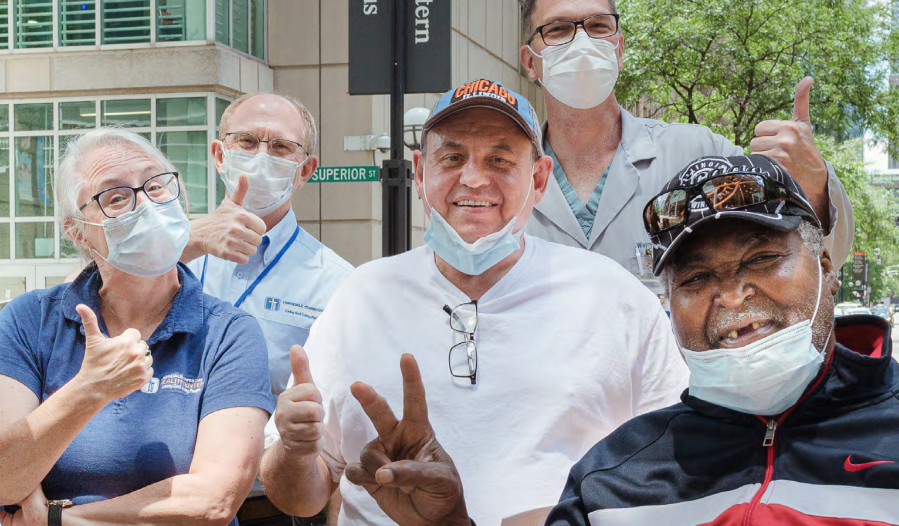2023 Homelessness Health Systems Report
This report is the product of a collaboration including healthcare providers, homeless services and housing providers, advocates, people with lived experience, and public health organizations, many of which came together at the height of the COVID-19 pandemic to implement emergency public health interventions. The group has continued as the Systems Change Collaborative to Improve the Health of People Experiencing Homelessness (“Systems Change Collaborative”), now looking beyond COVID-19 to identify where policy changes, additional capacity and new investments are needed to strengthen systems of care for this population.
The Systems Change Collaborative initiative, which was convened by the Chicago Department of Public Health (CDPH) and supported by the Illinois Public Health Institute (IPHI), Wilburn Strategic Solutions, and High Ground Partners, is an initiative of Healthy Chicago 2025, Chicago’s five-year plan to close the racial life expectancy gap by addressing the root causes of health, including housing. It builds upon CDPH’s increased investment in programs including teams of mobile healthcare providers bringing regular primary healthcare, behavioral healthcare, and critical infection prevention and control services into Chicago shelters; a forthcoming stabilization housing pilot program providing shelter, integrated physical and behavioral health services, and discharge planning for high utilizers of emergency systems; and accessible substance use and mental health care through initiatives including MAR Now and Crisis Assistance Response & Engagement Program (CARE).
please visit our Healthy Chicago website.
In their report, the Systems Change Collaborative recognized that the best public health intervention for individuals experiencing homelessness is housing - and housing is healthcare. Homelessness is detrimental to health. Poor health increases individuals’ risk of homelessness, and experiencing homelessness often produces rapid declines in health due to factors including chronic toxic stress, barriers to accessing care and to meeting basic needs such as sleeping and eating. For example, a recent evaluation of Chicago’s Flexible Housing Pool, an innovative permanent supportive housing program, found that from 2018-2021, individuals housed through the FHP had a 30% lower mortality rate than peers experiencing homelessness.
“People experiencing homelessness also experience inequitable health outcomes, including for example highly disproportionate rates of diabetes, hypertension, HIV/AIDS, and major depression, along with heightened risk of violence victimization,” said CDPH Commissioner Allison Arwady, M.D. “The COVID-19 pandemic laid bare the life-and-death consequences of these inequities – and deepened our resolve to work together, improve holistic systems of care for Chicagoans experiencing homelessness, and ultimately increase access to affordable and supportive housing.”
16 Key Recommendations to Support Health, Equity, and Wellbeing for People Experiencing Homelessness in Chicago
Care Integration
- Maintain, evaluate, and expand shelter-based care model
- Refine and benchmark standards for shelter-based care, and incorporate into shelter/CoC standards
- Increase access and support for substance use disorder treatment, including medication assisted treatment (MAT), Narcan knowledge and training, overdose follow-up, and drop-in services
State and Federal Advocacy
- Advocate for additional flexibility for healthcare reimbursement mechanisms in Medicaid
- Advocate for Medicaid funding for tenancy supports
- Increase medical respite beds
Homeless Service Systems
- Expand non-congregate shelter, stabilization housing, and low-barrier shelter programs
- Increase accessible emergency shelter options and improve processes to ensure individuals with disabilities are directed to appropriate shelter
- Increase trauma training and support for shelter/housing continuum staff
- Expand case conferencing within the CoC to include MCO/care coordinators and healthcare teams
- Increase the role people with lived expertise have in decision making about homeless services, programs, and policies
Data Systems
- Establish a Community Information Exchange (CIE) as a data bridge between healthcare and homeless service providers
- Design and implement a Health/Healthcare Checklist in HMIS for people leaving shelter to permanent housing
- Create a new process to ensure people experiencing homelessness have disability status captured in HMIS by medical professionals
System Funding And Sustainability
- Streamline reporting requirements between funders, and support foundation partners to conduct advocacy and public funder education on behalf of funding sectors and align funders on best practices
- Increase pay equity among homeless service staff, raise rates, and support employment opportunities for people with lived expertise in the sector.

Fully implementing these recommendations will require action across partners and levels of government in partnership with CDPH, including affordable and supportive housing systems, homeless response systems, policymakers, behavioral health providers, public health systems, everyday Chicagoans and others. CDPH looks forward to continued collaboration with all partners.
Access the full report, including information about our progress so far, here.




